| Abbreviation | S.S.M.I |
|---|---|
| Formation | 1892 |
| Founder | Blessed Josaphata Hordashevska |
| Type | Catholic religious order |
Superior General | Sister Sofia Lebedowicz, SSMI |
| Website | ssmi |
The Sisters Servants of Mary Immaculate (S.S.M.I.) are a religious congregation of women in the Ukrainian Greek-Catholic Church. They were founded in 1845 in Lviv, then part of the Austro-Hungarian Empire and now in Ukraine, the first such organization of religious women in this Eastern Catholic Church. The founders were the Blessed Josaphata Hordashevska and the Servant of God, Father Jeremiah Lomnytskyj, O.S.B.M.
They are a different religious institute than the Congregation of Sisters Servants of Mary Immaculate founded by Honorat Koźmiński.
The Ukrainian Catholic Church was formed in 1595 through the Union of Brest, when several bishops of the Ukrainian Orthodox Church, the King of Poland, agreed to enter into full communion with the Holy See of Rome. The adherents of this union were a minority within the general Ukrainian population, with strong hostility coming from the adherents of the Orthodox Church. Ukrainian Catholics retained the traditions of Orthodox Church institutions, one of which was an enclosed religious order as the sole approved option for women who wanted to live a religious lifestyle. [1] They were, however, also in touch with the ecclesiastical developments of Western Europe.
Father Jeremiah Lomnytskyj, a Basilian monk, was among the first members of his religious Order trained under Polish Jesuit Fathers. From his experiences with the Polish Roman Catholics, Lomnytskyj conceived the idea of establishing communities of active Religious Sisters to assist the Basilian Fathers in answering the great social needs of the people, as had emerged throughout Western Europe during that era.
Lomnytskyj was invited in 1891 by Father Cyril Sielecki, a widowed priest, to give a mission at the parish of Zhuzhel (now called Zhuzheliany) where he was leaving as pastor. The mission was very well received, and he was approached by several young girls who wanted to give their lives to God. When he indicated that the usual dowry would be needed for admission to a monastery, one girl indicated that she was too poor for that. Lomnytskyj was troubled by this. Michaelina Hordashevska, later to be known as Mother Josaphata, had already been discerning a religious vocation. Fr. Lomnytskyj acted as her spiritual director in Lviv, and under his guidance, she made a private vow of chastity. [1] Lomnytskyj now pondered whether she could be instrumental in realizing this goal of establishing active religious communities of women in their Church, beginning with these several young women. He then invited her to become the first member of this new way of life he was proposing, which he and Seletsky would direct, advising her that there would be much work and suffering ahead. Michaelina accepted his invitation. [2]
In June 1892, Michaelina Hordashevska went to stay with the Polish Roman Catholic Felician Sisters, a fairly new congregation which had been founded with a similar goal by a Polish noblewoman. After two months, she returned to her native city of Lviv on 22 August, and fashioned the religious habit which was to distinguish the new Congregation. Two days later, she was formally given this habit and the religious name Josaphata, in honor of the revered Ukrainian Catholic martyr, Saint Josaphat. [1]
Hordashevka then went to the nearby village of Zhuzhel (site of the parish mission where seven other young women who had been recruited for this new community were waiting to establish a community. They then began their preparation to start their lives of service. Sister Josaphata was appointed Superior of the community. She taught and encouraged the other members of the community, telling them: "Serve your people where the need is greatest".
Within ten years, the 8 Sisters had grown to 128, living in 26 convents throughout Ukraine. They were able to hold their first General Chapter in 1902, in the course of which Sister Josaphata Hordashevka was elected the first Superior General of the Congregation, with Father Jeremiah Lomnytskyj resigning his position as Director of the institute. Unfortunately, severe divisions arose within the Congregation, driving Hordashevka to submit her resignation soon afterwards to the Metropolitan Archbishop of Lviv, the Servant of God Andrey Sheptytsky, O.S.B.M., who accepted it and appointed a new Superior General.
After this, Sister Josaphata was denied permission to make permanent vows, until the next General Chapter went ahead and voted her as Vicaress General of the Congregation, despite her ineligibility for the office due to her canonical status. The delegates of the Chapter petitioned the Metropolitan to allow her to make her final vows, a petition which was granted and she assumed the post. Three years later, though, Mother Josaphata was diagnosed with tuberculosis of the bone. She died from this disease in 1919, at the age of 49.
The Sisters Servants had been founded to minister to the spiritual, moral, intellectual and social needs of the Ukrainian people. As many of them emigrated to other countries over the years, in search of a better life, the Sisters branched out from western Ukraine to Canada, Yugoslavia, Brazil, the United States, Poland, Slovakia, Italy, Great Britain, France, Argentina, Germany, Australia and Kazakhstan.
After World War II, however, Ukraine was absorbed into the Soviet Union. The Communist government which took control of the region soon suppressed the Sisters and seized their properties, as well as that of all other religious institutions. The Sisters were forced to live hidden lives of dedication. The Superior General at that time, Mother Veronica Gargil, was able to flee the Soviet Union with another member of the General Council, first to Czechoslovakia, then, in 1945, to Rome. Shortly after that, the Canadian Province of the Congregation was able to purchase property, which was established as the international motherhouse of the Congregation. Mother Josaphata's remains were exhumed in 1982 and transferred to the Generalate in Rome.
With the collapse of the Soviet Union in 1991, the Sisters who had lived their consecrated lives in secret were able to re-emerge as a public association. Members of the Congregation from throughout the world joined together to give support and help to their Sisters in Ukraine.
In 1992 the Congregation celebrated the centennial of its founding with Sisters Servants from thirteen countries participating in a Divine Liturgy of Thanksgiving and a special Jubilee program held in Ukraine.
On 6 April 1998, Pope John Paul II issued the decree acknowledging Mother Josaphata's heroic virtues, and the occurrence of a miracle effected through intercession to her. She was beatified on 27 June 2001, during a visit by that Pope to her native city of Lviv, along with another member of the Congregation who had been murdered by a Soviet soldier and over twenty other martyrs of the Ukrainian Catholic Church.
As of 2018, there are about 700 sisters serving in Brazil, Canada, Poland, Serbia, Slovakia, Ukraine, the United States. The headquarters are in Rome. In the United States, the sisters operate St. Joseph’s Adult Care Home in Sloatsburg, New York. [3]
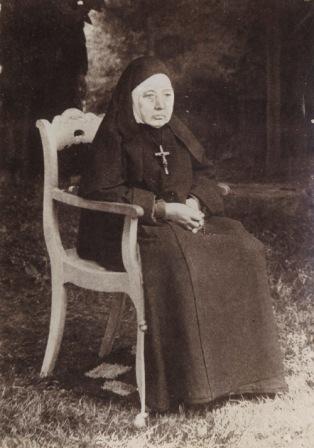
The Felician Sisters, officially known as the Congregation of Sisters of St. Felix of Cantalice Third Order Regular of St. Francis of Assisi (CSSF), is a religious institute of pontifical right whose members profess public vows of chastity, poverty, and obedience and follow the evangelical way of life in common. This active-contemplative religious institute was founded in Warsaw, Poland, in 1855, by Sophia Truszkowska, and named for a shrine of St. Felix, a 16th-century Capuchin saint especially devoted to children.

The Sisters, Servants of the Immaculate Heart of Mary (I.H.M.) is a Catholic religious institute of sisters, founded by Fr. Louis Florent Gillet, CSsR, and a co-founder of the Oblate Sister of Providence, Mother Theresa Maxis Duchemin, in 1845.
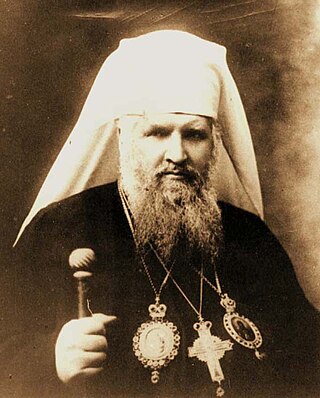
Andrey Sheptytsky, OSBM was the Greek Catholic Archbishop of Lviv and Metropolitan of Halych from 1901 until his death in 1944. His tenure in office spanned two world wars and seven political regimes: Austrian, Russian, Ukrainian, Polish, Soviet, Nazi German, and again Soviet.

Louis Philippe Adélard Langevin was a Canadian Oblate priest and Archbishop of Saint-Boniface. He founded the La Liberté newspaper published in Manitoba on May 20, 1913.

The Order of Saint Basil the Great, also known as the Basilian Order of Saint Josaphat, is a Greek Catholic monastic order of pontifical right that works actively among Ukrainian Catholics and other Greek-Catholic churches in central and Eastern Europe. The order received approbation on August 20, 1631, and is based at the Monastery of the Holy Trinity, Vilnius.

Josaphata Hordashevska, born Michaelina Hordashevska an ethnic Ukrainian Greek-Catholic in the Austro-Hungarian Empire Religious Sister, was the first member and co-foundress of the Sisters Servants of Mary Immaculate.

Josaphat Joseph Kotsylovsky (Ukrainian: Йосафат Йосиф Коциловський) was a Ukrainian Greek Catholic bishop and martyr.
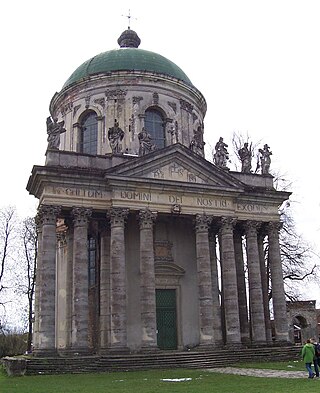
The Ukrainian Orthodox Greek Catholic Church (UOGCC) is an unregistered Eastern Independent Catholic religious movement that was established by Basilian priests, predominantly from Slovakia, who schismated from the Ukrainian Greek Catholic Church and declared the creation of the new church in 2009 based in Pidhirtsi, Ukraine.
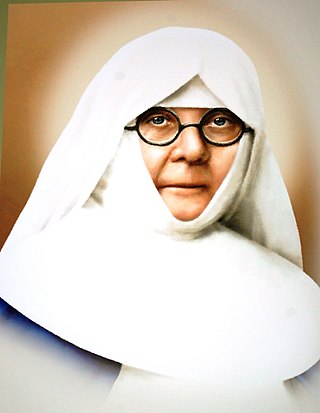
Marcelina Darowska was a Polish religious sister who was beatified by Pope John Paul II in 1996. She was inspired to co-found the Sisters of the Immaculate Conception of the Blessed Virgin Mary, a congregation in Poland, Belarus and the Ukraine.

This is a list of leaders of the Ukrainian Greek Catholic Church which is a sui juris of the Catholic Church that is in full communion with the Holy See. As an Eastern Catholic church, it uses the Byzantine rite in the Church slavonic and Ukrainian languages in its liturgies. Leaders have held several titles over the centuries. The modern primate of the church holds the position of a major archeparch.
The Poor Servants of the Mother of God are a religious congregation founded in 1869 by Mary Magdalen of the Sacred Heart, Frances Margaret Taylor. She was closely assisted by her friend and benefactor Lady Georgiana Fullerton, and following her death, by her husband, A G Fullerton (1808-1907).
The Congregation of the Mother of Carmel (C.M.C.) is a Syro-Malabar Catholic centralized religious institute of consecrated life of Pontifical Right for women founded in 1866. It was the first native congregation for women in that church.
Efraim Basilio Krevey, O.S.B.M. was the Ukrainian Greek Catholic bishop of the Ukrainian Catholic Eparchy of São João Batista em Curitiba, Brazil.

Kyrylo Seletskyi was a Ukrainian priest of the Greek Catholic Diocese of Przemyśl, and an educational and social activist. He was the founder of the religious congregations of the Sisters Servants of Mary Immaculate, as well as the Sisters of Saint Joseph. He was recognized as a servant of God.
Kavske is a village in Stryi Raion, Lviv Oblast in western Ukraine. It belongs to Stryi urban hromada, one of the hromadas of Ukraine. Local government is administered by Kavska village council. The population of the village is about 1453 people.
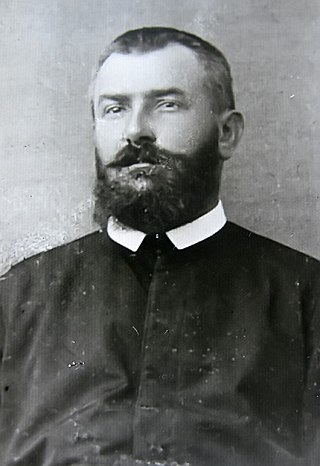
Jeremiah Lomnytskyj, O.S.B.M. was a Ukrainian Basilian priest, missionary and an educational and church activist. He and Josaphata Hordashevska founded the religious congregation of the Sisters Servants of Mary Immaculate. Lomnytskyj is recognized as a servant of God.

Bishop Dionisio Paulo Lachovicz, O.S.B.M. is a Brazilian-born Ukrainian Greek Catholic hierarch. He was an Apostolic Visitor for the Ukrainian Greek Catholics in Italy and Spain. Prior to this appointment, he served as a Curial Bishop of the Major Archeparchy of Kyiv-Halych from December 21, 2005, until January 19, 2009, under the title of Titular Bishop of Egnatia. From September 5, 2019, he is a Delegate with the rights of Apostolic Exarch for the Ukrainian Catholic Apostolic Exarchate of Italy.
Athanasiy Velyki, O.S.B.M. was a Ukrainian Basilian priest, historian, member of the Shevchenko Scientific Society from 1953.
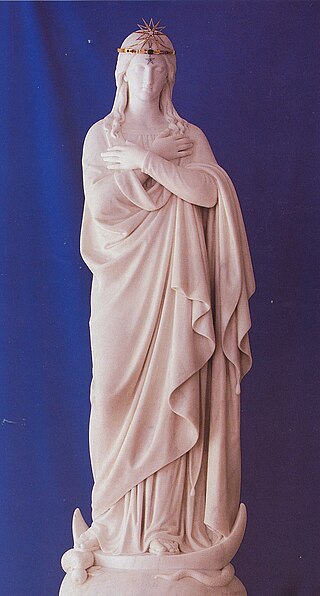
Congregation of the Sisters of the Immaculate Conception of the Blessed Virgin Mary are a female religious congregation di diritto pontificio: the members of this congregation add the initials CSIC to their name

Emellia Prokopik was a nun of the Catholic Church in Ukraine. She served for 12 years as Superior General of the sisters of the Order of Saint Basil the Great of the Province of Jesus, Lover of Humanity in Pennsylvania, what the first Ukrainian bishop in the US called "cradle of the Ukrainian Catholic Church in the United States."